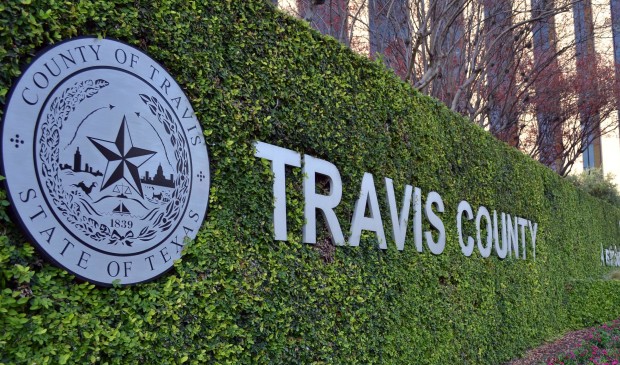Travis County reallocates CARES Act housing assistance funding to meet deadlines, talks Covid-19 plasma funding effort
Friday, October 16, 2020 by
Savana Dunning The Travis County Commissioners Court voted unanimously to reallocate Coronavirus Aid, Relief and Economic Security (CARES) Act funding in order to spend all of its funding before the Dec. 30 deadline.
Travis County received $61,147,507.20 from the federal CARES Act. At the Oct. 13 meeting of the Commissioners Court, the Planning and Budget Office gave an update on projected CARES Act spending through Dec. 30 with recommendations on reallocating unused funds. The county has to expend all allotted funds by Dec. 30 or give the remaining money back to the U.S. Treasury Department.
The county has nine CARES Act funding programs. The approved reallocation removes $3,500,000 from the Health and Human Services rent and mortgage relief program, moving part of the money to fill the $540,000 shortfall HHS discovered in its TCTX Serve program, which provides relief grants to Travis County nonprofits.
The rest of the $2,950,000 will be added to the county’s direct response program. The county also earmarked an equal amount of the $17 million Emergency Reserve in the Fiscal Year 2021 budget, which can be used after Dec. 30, for mortgage and rental assistance. With the additional earmark, Budget Director Travis Gatlin said the county will have $11.9 million of non-CARES Act money set aside for rental and mortgage assistance, utility aid and general Covid relief.
The recommendation also reallocates money initially designated to aid small towns in Travis County. Three cities, Round Rock, Village of the Hills and Volente, declined to sign interlocal agreements with the county to receive funding, freeing $267,245 in funds to go toward the county’s direct response program as well. Just before the meeting, Elgin gave notice that it was also declining to sign the agreement, but the Planning and Budget Office requested it discuss that extra funding after the next update.
Part of the recommendation the commissioners approved included a letter to the participating small cities to remind them of the upcoming Oct. 31 deadline to provide reimbursement documentation.
Commissioner Margaret Gómez motioned to approve the resolution, which County Judge Sam Biscoe seconded.
Before the vote, Commissioner Brigid Shea asked whether the Planning and Budget office had planned to fulfill blood donation nonprofit We Are Blood’s request for $600,000 in CARES Act funding for advertising and testing as a part of a 12-month program to ramp up its Covid-19 convalescent plasma supply and testing efforts. Planning and Budget recommended using revenue from the county’s General Fund instead of CARES Act money.
Convalescent plasma comes from people who have recovered from an illness, such as Covid-19, and is used as part of a therapy to help others recover. We Are Blood President and CEO Marshall Cothran presented the issue to the court at its Sept. 8 meeting, arguing that the organization has a rapidly depleting convalescent plasma stock and has to meet a Food and Drug Administration Dec. 1. plasma testing deadline in order to help Covid patients in Travis County.
We Are Blood’s initial campaign efforts to get plasma donors resulted in 1,600 qualification form submissions, but only 400-500 of those donors actually qualified, spokesperson Nick Canedo said.
“A limiting factor for convalescent plasma donors is that, by their nature, they had to become infected with Covid-19, recovered from Covid-19 and now be healthy enough to donate,” Canedo said. “That means that amongst our population we have a small target audience we have to get in front of so they know this convalescent plasma program exists.”
Following the presentation, the commissioners decided to vote on the issue at a later meeting. At the court’s Oct. 13 meeting, Commissioner Gerald Daugherty gave an update on his efforts to get help from other organizations to fund the $600,000. Although the city of Austin declined to help, Daugherty said he contacted Williamson County, which indicated it could use some of its CARES Act funds, as well as the St. David’s Foundation.
Commissioner Shea questioned whether Travis County should be bearing “the lion’s share” of that request, arguing that Daugherty should urge the governor’s office or U.S. Congress members to pass additional CARES Act funding, as the county has planned expenditures beyond what the current CARES Act funding can bear. Daugherty argued that it would be faster to pool funds locally rather than make requests to Washington or the governor’s office.
“I mean, how do you make things work up there in any sort of expeditious manner?” Daugherty said about the U.S. Congress. “I tried to stay locally because I felt like I could work with those people, and if I can get a third of a commitment … that’s a pretty good deal for me.”
Daugherty promised to bring the issue back to the Commissioners Court once he has more details on other organizations’ ability to help. The Planning and Budget Office will return with another update on CARES Act funding on Oct. 27.
The Austin Monitor’s work is made possible by donations from the community. Though our reporting covers donors from time to time, we are careful to keep business and editorial efforts separate while maintaining transparency. A complete list of donors is available here, and our code of ethics is explained here.
You're a community leader
And we’re honored you look to us for serious, in-depth news. You know a strong community needs local and dedicated watchdog reporting. We’re here for you and that won’t change. Now will you take the powerful next step and support our nonprofit news organization?




